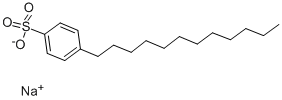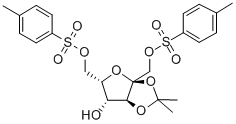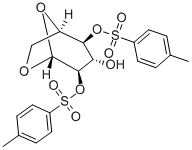DIETHYLENE GLYCOL BIS(P-TOLUENESULFONATE)
Synonym(s):2,2′-Oxydiethyl ditosylate;Bis(2-tosyloxyethyl)ether;Diethylene glycol ditosylate
- CAS NO.:7460-82-4
- Empirical Formula: C18H22O7S2
- Molecular Weight: 414.49
- MDL number: MFCD00026001
- EINECS: 628-596-3
- SAFETY DATA SHEET (SDS)
- Update Date: 2024-12-18 14:08:52

What is DIETHYLENE GLYCOL BIS(P-TOLUENESULFONATE)?
Description
Tos-PEG3-Tos is a PEG linker containing two tosyl groups. The hydrophilic PEG spacer increases solubility in aqueous media. The tosyl group is a very good leaving group for nucleophilic substitution reactions.
Chemical properties
White to off-white powder
The Uses of DIETHYLENE GLYCOL BIS(P-TOLUENESULFONATE)
Diethylene glycol di(p-toluenesulfonate) was used in the synthesis of bis(dibenzosulfoxo)-27,30,35,38-tetramethyl-24-crown-6, bis(dibenzosulfoxo)-21,24,29,32-tetramethyl-18-crown-4, dibenzosulfoxo-15,18-dimethyl-12-crown-3 and dibenzosulfoxo-12,15-dimethyl-9-crown-2 macrocycles.
Purification Methods
Purify the ester by recrystallisation from Me2CO and dry it in a vacuum. [Beilstein 11 III 225.]
Properties of DIETHYLENE GLYCOL BIS(P-TOLUENESULFONATE)
| Melting point: | 87-89 °C (lit.) |
| Boiling point: | 581.2±45.0 °C(Predicted) |
| Density | 1.301±0.06 g/cm3(Predicted) |
| storage temp. | Sealed in dry,Room Temperature |
| solubility | Chloroform (Slightly), Ethyl Acetate (Slightly) |
| form | Solid |
| color | Off-White |
| BRN | 583800 |
| CAS DataBase Reference | 7460-82-4(CAS DataBase Reference) |
| EPA Substance Registry System | Ethanol, 2,2'-oxybis-, bis(4-methylbenzenesulfonate) (7460-82-4) |
Safety information for DIETHYLENE GLYCOL BIS(P-TOLUENESULFONATE)
| Signal word | Warning |
| Pictogram(s) |
 Exclamation Mark Irritant GHS07 |
| GHS Hazard Statements |
H315:Skin corrosion/irritation H319:Serious eye damage/eye irritation H335:Specific target organ toxicity, single exposure;Respiratory tract irritation |
| Precautionary Statement Codes |
P261:Avoid breathing dust/fume/gas/mist/vapours/spray. P264:Wash hands thoroughly after handling. P264:Wash skin thouroughly after handling. P271:Use only outdoors or in a well-ventilated area. P280:Wear protective gloves/protective clothing/eye protection/face protection. P302+P352:IF ON SKIN: wash with plenty of soap and water. P305+P351+P338:IF IN EYES: Rinse cautiously with water for several minutes. Remove contact lenses, if present and easy to do. Continuerinsing. |
Computed Descriptors for DIETHYLENE GLYCOL BIS(P-TOLUENESULFONATE)
| InChIKey | VYVPNTJBGPQTFA-UHFFFAOYSA-N |
New Products
Tert-butyl bis(2-chloroethyl)carbamate 4-Methylphenylacetic acid N-Boc-D-alaninol N-BOC-D/L-ALANINOL N-octanoyl benzotriazole 3-Morpholino-1-(4-nitrophenyl)-5,6-dihydropyridin- 2(1H)-one Furan-2,5-Dicarboxylic Acid DIETHYL AMINOMALONATE HYDROCHLORIDE 1,1’-CARBONYLDIIMIDAZOLE R-2-BENZYLOXY PROPIONIC ACID 1,1’-CARBONYLDI (1,2-4 TRIAZOLE) N-METHYL INDAZOLE-3-CARBOXYLIC ACID (2-Hydroxyphenyl)acetonitrile 4-Bromopyrazole 5-BROMO-2CYANO PYRIDINE 5,6-Dimethoxyindanone 5-broMo-2-chloro-N-cyclopentylpyriMidin-4-aMine 2-(Cyanocyclohexyl)acetic acid 4-methoxy-3,5-dinitropyridine 1-(4-(aminomethyl)benzyl)urea hydrochloride 2-aminopropyl benzoate hydrochloride diethyl 2-(2-((tertbutoxycarbonyl)amino) ethyl)malonate tert-butyl 4- (ureidomethyl)benzylcarbamate Ethyl-2-chloro((4-methoxyphenyl)hydrazono)acetateRelated products of tetrahydrofuran








You may like
-
 Diethylene Glycol Bis(p-toluenesulfonate) CAS 7460-82-4View Details
Diethylene Glycol Bis(p-toluenesulfonate) CAS 7460-82-4View Details
7460-82-4 -
 Diethylene glycol di(p-toluenesulfonate) 98% (HPLC) CAS 7460-82-4View Details
Diethylene glycol di(p-toluenesulfonate) 98% (HPLC) CAS 7460-82-4View Details
7460-82-4 -
 Diethylene glycol bis(p-toluenesulfonate) 95% CAS 7460-82-4View Details
Diethylene glycol bis(p-toluenesulfonate) 95% CAS 7460-82-4View Details
7460-82-4 -
 Diethylene glycol di(p-toluenesulfonate) CAS 7460-82-4View Details
Diethylene glycol di(p-toluenesulfonate) CAS 7460-82-4View Details
7460-82-4 -
 1975-50-4 98%View Details
1975-50-4 98%View Details
1975-50-4 -
 14714-50-2 (2-Hydroxyphenyl)acetonitrile 98+View Details
14714-50-2 (2-Hydroxyphenyl)acetonitrile 98+View Details
14714-50-2 -
 118753-70-1 98+View Details
118753-70-1 98+View Details
118753-70-1 -
 733039-20-8 5-broMo-2-chloro-N-cyclopentylpyriMidin-4-aMine 98+View Details
733039-20-8 5-broMo-2-chloro-N-cyclopentylpyriMidin-4-aMine 98+View Details
733039-20-8
Statement: All products displayed on this website are only used for non medical purposes such as industrial applications or scientific research, and cannot be used for clinical diagnosis or treatment of humans or animals. They are not medicinal or edible.